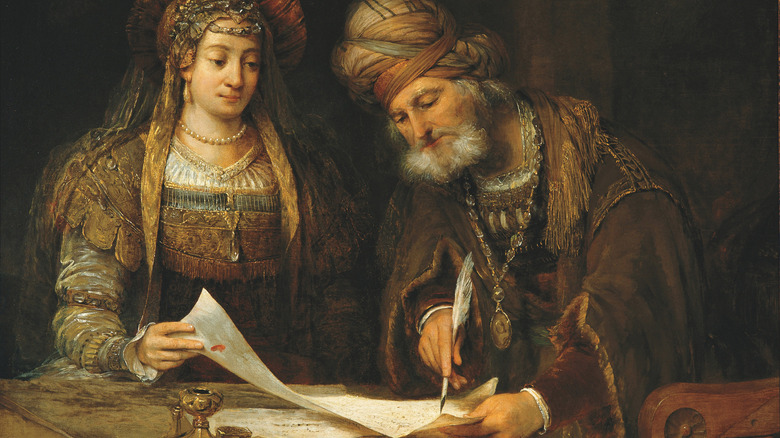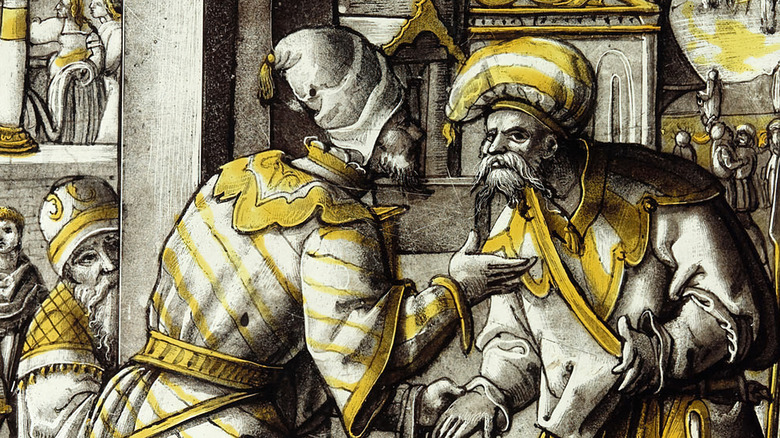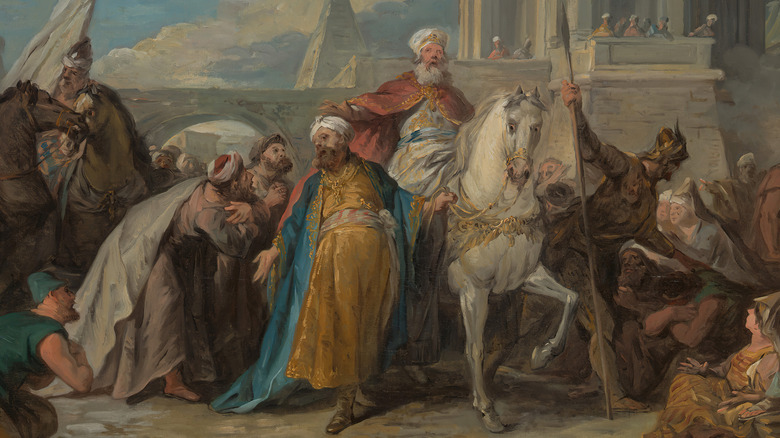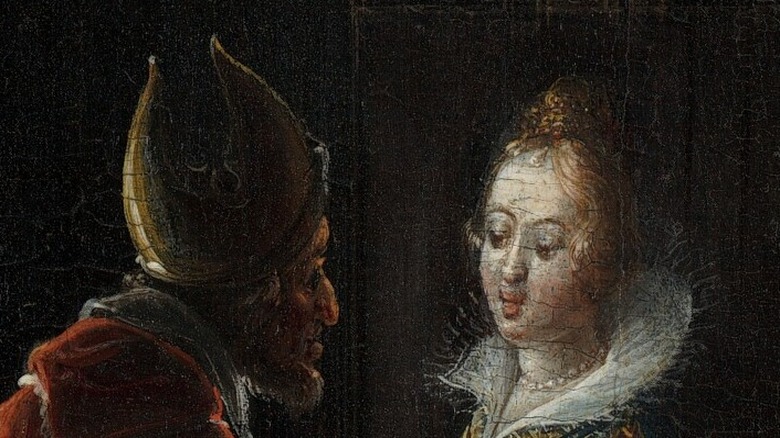Who Was Mordecai From The Bible?
Mordecai: he's not just the uncle Motel was named for in "Fiddler on the Roof." The Mordecai of the Bible was the guardian of a queen, vizier to a king, and the man who saved the Jewish people from slaughter, commemorated in the holiday of Purim. He's also a central figure in one of the most controversial books of the Bible for Jewish and Christian believers (per Britannica).
That book is the Book of Esther, named for Mordecai's cousin. In the story's beginning (via Bible Gateway), Esther (whose real name was Hadassah) was an orphan girl who was raised by Mordecai, a Benjaminite who lived in the city of Susa, the capital of Persia. He cared for his cousin like she was his own daughter, but he also forbade her to reveal that she was a Hebrew. Meanwhile, Xerxes, king of Persia, was furious that his wife Vashti wouldn't obey his command to appear at a banquet in her crown. On the advice of his wise men, Xerxes stripped Vashti of her position as queen, issued an edict reinforcing a man's authority in his own home, and summoned all beautiful women to the citadel of Susa so that he might choose a new wife.
Being beautiful, Esther was brought into the king's harem and quickly became a favorite of its keeper. Xerxes himself was charmed by her and made her the new queen of Persia. All the while, Mordecai waited outside the harem, keeping tabs on his cousin's welfare and treatment.
Mordecai uncovered conspiracies and spun his own
Soon after his cousin and ward Esther became the new queen of Persia, Mordecai was at the gates of Xerxes' palace when he overheard two disgruntled officers conspiring to kill their king. He relayed what he had heard to Esther, who passed it on to her new husband. The plot was quickly uncovered and the guilty officers were executed via impalement. Esther made sure to mention that it was her cousin who had saved the king.
But that good deed went unmentioned when Mordecai was the only man not to bow to Haman, an elevated noble to whom all at the palace gates were commanded to pay homage. The Bible doesn't explicitly say why Mordecai refused to bow. There are two popular interpretations of the incident (discussed at The Torah): that Mordecai considered the homage to be idolatrous and against his faith, or that it was an allegoric depiction of the antagonism between the Israelites and the Amalekites.
In either event, Haman decided to wipe out all the Jews in Persia for Mordecai's insolence. He convinced the king to give the order and erected a pole to impale Mordecai. But Xerxes remembered Mordecai's previous service and asked Haman how such a man should be honored. Haman, who initially thought he would receive the honor, was ordered to bestow it on his enemy. Meanwhile, Mordecai again alerted Esther, who revealed her heritage to the king and begged him to rescind the order. An enraged Xerxes had Haman impaled.
His story might have justified appropriation of a holiday
After they outwitted Haman and saved the Jews of Persia from genocide, both Mordecai and Esther rose in King Xerxes' esteem. Esther received all of Haman's lands and incomes, and Mordecai became vizier to the king and overseer of Haman's estate. Because Haman's earlier edict that the Jews be killed was done under the royal seal and could not be rescinded, Xerxes gave his new advisor leave to issue his own decree. Mordecai granted his people the right to arm themselves and counterattack against those who came for them. On the 13th day of Adar (the 12th month of the Jewish religious calendar according to Chabad.org), the Jews triumphed over their enemies, and their status within Persia was great.
Mordecai and Esther's reversal of fortune for their people is celebrated with the Jewish holiday of Purim, celebrated on the 14th day of Adar (falling somewhere between late winter and early spring in the modern calendar). Dating back at least to 124 BCE, modern Purim is celebrated with costumes and masks, not unlike Europe's Carnival. But according to Elon Gilad of Haaretz, the historicity of the Book of Esther is highly suspect, and many suspect that Purim is a pagan holiday that Esther tied to Judaism. Candidates for such a holiday include the Babylonian New Year, a Persian festival of the dead, and a Greek festival of wine, but none has an airtight case as the forebearer of Purim (per My Jewish Learning).
The Book of Esther is one of the Bible's most controversial
Mordecai and the Book of Esther may have inspired an ancient holiday still celebrated to this day, but their inclusion in the Bible has been controversial for millennia. The Book of Esther never mentions God, instead emphasizing the Jewish people as a distinct ethnic group within the kingdom of Persia subject to persecution. This concern with secular affairs, and the accuracy of certain details about the Persian court, suggest real events, but there is limited support for the idea that Esther has a historical basis. But far more common, and more credible, is the theory that Esther is a work of fiction, a highly symmetrical story (using a pattern called chiasm according to Bible Project) that has been interpreted and reinterpreted throughout the ages.
For many, however, Esther's historicity is less of an issue than its presence in the Bible when it's the only book included not to discuss God. A vague allusion by Mordecai to the Jews finding salvation if Esther fails to try to save them has been interpreted as a religious comment, a sign of God's indirect hand in the affairs of men (per Judaism 101). But this wasn't enough for early Greek translators, who made significant changes to the book to emphasize the piety of its heroes. The canonicity of these changes among Christians varies by denomination; Catholics and the Orthodox accept them, and Protestants regard them as Apocrypha.



